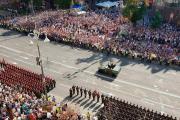The rite of marriage is nikah, or Islam's attitude towards civil marriage. What is Nikah (the act of marriage) among Muslims Nikah prayer of the bride and groom
Nowadays, in Russia and around the world, the so-called “civil marriage”, in other words, cohabitation, is increasingly practiced between a man and a woman. Previously, in order to start a family, young people enlisted the blessing of their parents and performed the sacrament of the wedding. Due to the fact that there are several religions in the world and many of their offshoots, not all couples got married in a church. Such a marriage without a wedding was called civil. This name was fixed in the XVI century in the Netherlands. Today, this word means something else. This word usage became widespread in speech by the end of the 20th century and means the coexistence of a man and a woman without marriage registration.
While more and more young couples prefer not to burden themselves with marriage, society is divided into two camps. Civil marriage has many ardent supporters and no less principled opponents. It happens that a difference of opinion on this important issue even provokes a break in relations: for example, he dreams of giving her his last name and putting a ring on his finger, and she directly says that she is not ready, does not want and will not register a relationship. Although more often it happens the other way around: she is “unbearable to get married”, and he “sincerely wonders” why this stamp is needed in the passport at all, because we love each other anyway!
One of the main arguments usually made by supporters of "civil marriage" is good way test their relationship by joint housekeeping. But is this not a sign of doubt that the person you have chosen is really right for you and you are ready to spend your whole life with him? In other words, many are simply afraid of responsibility and are not sure of their choice, because responsibility in a civil marriage is much lower. Spouses can cheat on each other without guilt. Also, one of them may simply leave one day, taking his things, without explaining any reasons.
In addition, according to statistics, women who are in a civil marriage endure pregnancy and childbirth worse, which subsequently affects the health of the child. A woman does not have confidence that tomorrow she will not be left alone with a child in her arms, which, as all the same statistics show, happens quite often.
One can enumerate many negative aspects of civil marriage from the point of view of secular society, and one can think of many reasons to justify it. And what is the attitude of religion towards such marriages? What does marriage mean in terms of Islam and how does it relate to the cohabitation of a man and a woman? We will try to answer these questions in this article.
 According to Islam, a mandatory condition for the coexistence of a man and a woman is nikah - marriage. One of the other names for nikah is the Arabic word zawaj, that is, "connection, union." The conditions for the validity of a marriage are: 1) the consent (rizalyk) of the bride and groom; 2) the presence of at least two witnesses; 3) the absence of prohibitions for marriage, that is, neither a woman nor a man are those with whom, according to Sharia, marriage cannot be entered into, for example, because of the proximity of kinship or religion (women cannot marry non-Muslims, and men are forbidden marry unbelievers or polytheists); 4) providing the bride with a marriage gift (mahr), which, unlike the kalym, is mandatory and the form of which the bride herself chooses, both tangible means, such as money or jewelry, and intangible ones, such as the promise of the groom to take his future wife in the hajj or something else at the choice of the bride. The Prophet Muhammad (peace and blessings of Allaah be upon him) said: “Give gifts to each other, for, verily, a gift removes hatred from the heart.”
According to Islam, a mandatory condition for the coexistence of a man and a woman is nikah - marriage. One of the other names for nikah is the Arabic word zawaj, that is, "connection, union." The conditions for the validity of a marriage are: 1) the consent (rizalyk) of the bride and groom; 2) the presence of at least two witnesses; 3) the absence of prohibitions for marriage, that is, neither a woman nor a man are those with whom, according to Sharia, marriage cannot be entered into, for example, because of the proximity of kinship or religion (women cannot marry non-Muslims, and men are forbidden marry unbelievers or polytheists); 4) providing the bride with a marriage gift (mahr), which, unlike the kalym, is mandatory and the form of which the bride herself chooses, both tangible means, such as money or jewelry, and intangible ones, such as the promise of the groom to take his future wife in the hajj or something else at the choice of the bride. The Prophet Muhammad (peace and blessings of Allaah be upon him) said: “Give gifts to each other, for, verily, a gift removes hatred from the heart.”
In Islam, the combination of marriage (nikah) is the cause of the emergence of the very community of people, brings them closer to each other and contributes to the establishment of love and cooperation between them. Thanks to marriage, an outsider becomes close and loved, which is also mentioned in the Qur'an: “He is the One Who created a person from water, and then established for him kinship by blood and marriage, because your Lord is the Almighty” (surah “al- Furqan, 25:54). In the hadeeth of the Prophet Muhammad (peace and blessings of Allaah be upon him) it is said: “Let those who do not have the opportunity to marry remain chaste until Allah enriches them by His grace.”
The main goal of marriage is to create a family - that God's gift, that value that one must not only be able to create, but also protect. A strong family is the key to the prosperity of society, and life without a family is like a tree without leaves and fruits. Allah Almighty and His Messenger (peace and blessings of Allah be upon him) encourage people to marry. So, the Prophet Muhammad (peace and blessings of Allaah be upon him) said: “Whoever married has gained half of the faith, let him fear Allah in regard to the remaining (her) half.” We know from the Qur'an that in the Last Abode, Allah will unite the believers with their spouses and offspring, if they turn out to be from among the pious, so that their joy will be complete. The Prophet Muhammad (peace and blessings of Allah be upon him) encouraged people to marry and forbade people to renounce the world and refuse to create a family, even for the sake of completely devoting oneself to the worship of Allah.
Nikah, as you know, has always been observed by the Muslims of our country, even in the most difficult communist times. Even then, although many did not know others important rules Islam, but they tried to make nikah. Now, many Muslims are also very poorly acquainted with their religion, but they still know about nikah and try to observe this rite before entering family life. This speaks, first of all, about the importance and significance of the marriage ceremony among Muslims and the unacceptability of the so-called civil marriage in the concept of cohabitation of a man and a woman without marriage (nikah). As for the registration of marriage in the registry office, this is not a prerequisite, but it is highly desirable in order to avoid possible problems and legal difficulties.
According to Islam, there are conditions right choice his life partner, the main of which are his good disposition and religiosity. The Messenger of Allah commanded the Muslims: "... by all means seek the one who is committed to religion" . He gave a similar covenant to Muslim women: “If people begin to come to you to woo, whose religiosity and character you are satisfied with, then marry them, but if you do not do this, then temptation will appear on earth and immorality will become widespread”. Naturally, in this case, the consent to the marriage of the bride herself is implied, since this is one of the necessary conditions for marriage. As for love, its presence is one of the requirements of Sharia (Islamic law), which means that each of the spouses should try to strengthen this love. When one of the companions began to woo a woman, the Prophet (peace and blessings of God be upon him) told him: “Look at her, for this will most contribute to the emergence of love between you.”
Nikah cannot be read between blood relatives, such as a brother and sister. It is also forbidden to read nikah to a Muslim woman who marries a representative of a religion other than Islam, as this is connected with the upbringing of children and the dependence of her religious beliefs on her husband's beliefs. As for the situation when a Muslim marries representatives of another religion, there are also restrictions here - for example, you can create a family with Christians and Jews, but you cannot marry polytheists or atheists. In addition, a Jewish or Christian woman must be pious, observing her religion. A prerequisite for such a marriage is Muslim children. Also, parents should pay attention to the religious beliefs of their son, because if he is weak enough in this respect and there is a danger that he or his children will leave the bosom of Islam, then such a marriage should not be allowed.
It should also be noted that a man can marry four women at the same time, however, he must comply with several conditions, the most important of which is fair treatment of all wives, which is directly stated in the Holy Quran: “If you are afraid that you will not equally fair to them, then only one ”(Sura“ Women 4: 3). This condition includes both moral-spiritual and material obligations of the spouse. So, in the hadith of the Prophet Muhammad (peace and blessings of Allaah be upon him) it is said: “The believer who has the best disposition has the most perfect faith, and the best of you is the one who treats his wife best of all.” However, unfortunately, some men do not pay worthy attention to this. In this regard, many have a distorted perception of this permission, but the prescriptions of Islam in this case are very categorical. It should also be noted that the number of such marriages, even in Muslim states, is extremely low, and this once again indicates that polygamy is not the rule, but the exception. In particular, with the quantitative superiority of women over men (for example, after military conflicts), the opportunity to marry two women seems to be the most competent way out of the difficult demographic situation that may develop in a particular area. Similarly, in the situation of widows or divorced women, the official status of the spouse is more rational than being in the position of mistresses.
 Nikah is usually preceded by matchmaking (khitba), during which the acquaintance between the side of the groom and the side of the bride takes place, and various details and conditions are negotiated. In the Turkic-Tatar tradition, during such a meeting, the groom's side pays the bride's side a certain amount, called kalym. It should be noted that the payment of kalym is a folk custom and, according to Sharia, is not obligatory.
Nikah is usually preceded by matchmaking (khitba), during which the acquaintance between the side of the groom and the side of the bride takes place, and various details and conditions are negotiated. In the Turkic-Tatar tradition, during such a meeting, the groom's side pays the bride's side a certain amount, called kalym. It should be noted that the payment of kalym is a folk custom and, according to Sharia, is not obligatory.
Thus, the marriage ceremony is performed as follows: in the presence of witnesses (at least two), the imam (or any Muslim with relevant knowledge) asks the bride and groom for their consent to marry between them. Then he asks about the presence of a marriage gift, and if the bride confirms that all her conditions are met, certain verses from the Koran are read (usually the first four verses from the “Women” sura are read) and a dua in which mercy and blessings are asked from the Almighty (barakat ) for the newly created family.
A Muslim wedding is celebrated according to certain customs, one of which is the wedding feast. His organization is the responsibility of the husband, who is assisted by members of his family and friends. However, one should not unnecessarily burden oneself with expenses, as a result of which often people are forced to borrow money, or even completely refuse to get married or marry because they cannot cover all wedding expenses. Thus, Muslims, moving away from the rules of their religion, harm and damage themselves, making life difficult for themselves and those around them.
A certain tradition has developed in the Turkic-Tatar environment, according to which on the first day the wedding ceremony is held directly (and, as a rule, in the bride's house), the next day - the wedding itself as a solemn event, and on the third day - the final Majlis in the husband's house, symbolizing the introduction of the wife into the husband's house, during which the ceremony of tying a special apron to the young mistress takes place. The meaning of this custom is that the question “Who tied this apron?” the young wife replies: "Mom", thereby emphasizing her close relationship to her husband's parents. Since then, both he and she have been trying to call their parents from the spouse's side mom and dad.
As for the trip to the registry office, according to the established tradition, it takes place on the day of nikah, however, from the point of view of Sharia, marriage registration can be carried out on any day. Nevertheless, it should be noted that in order to maintain morality and morality in society, registration should be carried out in parallel with a religious ceremony.
Those who, despite the condemnation of society and the prohibition from the point of view of religion, are faced with the choice of whether to live in a “trial marriage” or start a full-fledged Muslim family, let them remember the statistics: the vast majority of men (about 90%) living in a civil marriage believe themselves as bachelors, but women all consider themselves married.
Elvira Aleeva
The traditions of marriage in Islam have remained unchanged for many centuries. The Koran, the holy book of Muslims, says that the creation of a family is one of the main commandments of the Almighty. To this day, young men and women are in awe of the most important marriage ritual - the wedding ceremony.
The traditional Muslim wedding ceremony is called nikah. In accordance with religious traditions, all the faithful, when concluding a family union, go through this ceremony, otherwise the marriage will be considered invalid. This means that the joint residence of spouses without nikah, from the point of view of Islam, is illegal, and children will be born in sin.
In modern society, the fact of performing nikah is confirmed by a document that has no legal force. Despite this, Muslims continue to sacredly honor and observe the custom of their ancestors.
Nikah is a rite prescribed by Sharia (a set of rules regarding the life of Muslims, and based on the observance of the Koran). It symbolizes the sacred conclusion of marriage between a man and a woman. Its essence is not only in acquiring the right to legal family relations, living together, living and having children, but also in taking mutual obligations.
They are seriously preparing for nikah. First of all, young people communicate their intention to get married to their parents in order to receive their blessing. Future spouses discuss the most important points long before the wedding ceremony life together and their expectations of each other. So, a girl can warn her future husband that she intends to get an education, and only after that consider the issue of having children.
Muslims believe that all important issues, even the most intimate ones, should be discussed before marriage. to avoid unpleasant surprises in the future. Modern youth does not consider it immodest to come to their own nikah with a marriage contract in their hands, which is read out during the ceremony in front of witnesses, in the presence of a clergyman. 
Conditions for Nikah
In Islam, there is a clear regulation of the rules and conditions for entering into a religious marriage:
- nikah is concluded exclusively by mutual agreement of a man and a woman;
- future spouses must reach marriageable age;
- it is unacceptable that they be closely related;
- at the ceremony, the presence of a man from among the closest relatives of the bride, who acts as a guardian: father, brother or uncle, is obligatory. When this is not possible, other adult male Muslims are invited;
- the ceremony always takes place with male witnesses from each of the future spouses;
- the groom must certainly pay the mahr (money as wedding gift) to the bride. The amount depends on her desire. Modern Muslims often replace money with expensive jewelry, valuable property or real estate.
Interesting! According to Islamic tradition, mahr should not be excessive or too small.
The conditions for concluding a nikah are in many ways reminiscent of those that are customary to observe during secular registration of marriage. This suggests that they have passed the test of time and repeatedly confirmed their worth.
The ideal wife for a Muslim

Muslim men are extremely responsible in choosing their future wife. For them it is important that the girl:
- was healthy and pious;
- received a highly moral education;
- well versed in the Islamic religion.
It is desirable that she was still beautiful and rich. However, the faithful honor the warnings of the Prophet that it is wrong to make the external attractiveness of a woman and her level of wealth the main criteria. The prophet warned that external beauty could in the future have a detrimental effect on spiritual qualities, and wealth could become a cause of disobedience.
Criteria for choosing a future wife are based on the goals of creating a family because marriage is for:
- creating a harmonious union of loving people;
- birth and upbringing of children.
From this point of view, the parameters that Muslim men are guided by when choosing a life partner look quite logical.
Henna night

An Islamic woman has the right to marry more than once, but there is only one night of henna, 1-2 days before the first nikah. It symbolizes the separation of a girl from her stepfather's house and unmarried friends, and also means the beginning of a new life in the status of a wife, a married lady. In fact, “henna night” is a bachelorette party.
By tradition, the assembled women sing sad songs, and the bride cries. It is generally accepted that the more tears shed that night, the more successful and happier the upcoming marriage will be. In the old days, marriage really gave rise to sobs, because a young woman was separated from her relatives for a long time (sometimes forever). She was worried about moving into the family of the groom, with whom she might even be unfamiliar.
Now a lot has changed. The brides are no longer sad, but openly rejoice, singing and dancing. Often "henna night" takes place in a restaurant with cheerful music, held for the bride and her bridesmaids.
The traditional Muslim ritual opens with the "lighting of the henna". The groom's mother brings in a beautiful tray of henna and burning candles. It symbolizes hot mutual love future newlyweds. The event is attended by friends and relatives of the bride - elegant, with beautiful hairstyles. The hero of the occasion, as expected, is dressed in a luxurious red dress, and her head is covered with an elegant red veil. Guests sing songs and dance.
The future mother-in-law puts a gold coin into the palm of her son's bride and holds it tightly. At this point, the girl must make a wish. The hand is painted with henna and a special red bag is put on it. 
Then all the women present are decorated with patterns from a mixture of henna. An ornate pattern is applied, as a rule, on the hands. It is believed that this contributes to a happy marriage and a long family life. Unmarried young girls prefer a small ornament, often applying paint only to their fingertips - this is how they emphasize their modesty and innocence. Older women and those who already have a family richly paint their palms, hands, and sometimes feet.
The rite of nikah can take place in any language. The main thing is that the groom, bride and witnesses understand the meaning of what was said and what is happening.
At the beginning of the ceremony, the mullah announces a sermon:
- about the significance of the marriage union and the mutual responsibility of the spouses to each other;
- about the importance of a decent upbringing of offspring.
Traditionally, a relative of the bride during the ceremony asks her consent to marriage. At the same time, the silence of the bride does not mean that she objects. Spiritual traditions allow that being a virgin, the future wife may simply be too shy to express her “yes” out loud. 
If a woman does not want to marry, no one has the right to force her to do so. This applies to both relatives and the groom himself or representatives of the clergy. Forced marriage is considered a great sin in Islam. When the bride and groom express mutual consent, the imam or mullah announces that the marriage has been concluded. After that, excerpts from the Koran are read and prayers are offered for the happiness and well-being of the young family.
Important! In accordance with spiritual tradition, it is recommended to end nikah with a feast, to which many guests are called and plentiful treats are served.
Marriage for Muslims is not just a beautiful custom. In accordance with the wills of the Prophet, men who are able and willing to marry should do so. The concept of "opportunity" includes:
- normal physical and mental health;
- awareness of moral responsibility for the family and willingness to accept it;
- the required level of material security;
- literacy in matters of religion.
Muslims, not without reason, believe that the observance of these rules is an indispensable condition for happiness and harmony in marriage. 
Nikah with a Christian
Islam does not forbid Muslim men to marry Christian and Jewish women. At the same time, a woman is not obliged to change her faith, and forcing her to do so is considered a sin. However, it is desirable that in the future family members adhere to the same religion. This will avoid many disagreements in living together, including in matters of raising children.
Nikah with a girl of a different faith is carried out in compliance with all traditions, but at the same time there is a number of features:
- witnesses from the side of the bride must be Muslims, since the presence of representatives of other religions during the ceremony is unacceptable;
- the girl must be dressed in accordance with Islamic rules;
- when performing nikah, the bride says a special prayer - shahada - and receives a second (Muslim) name.
Interesting! Islamic women are only allowed to marry Muslims. They can create a family with representatives of other faiths only if the future husband converts to Islam.
Rite in the mosque

It is advisable to plan the marriage ceremony for Friday evening. Usually, Muslims perform nikah a few days before the secular procedure for registering a marriage.
Fees
It all starts with the fact that each of the future spouses, while still at home, completely washes the body and puts on formal attire. At the same time, it is long, closed and not tight-fitting, and the headdress (veil or scarf) completely covers the hair. For this reason, Muslim brides are spared the need to spend long hours at the hairdresser's on the eve of the ceremony.
As for the suit of the groom, modern men do not attach special importance to it, often choosing the usual "deuce". Recently, there has been a tendency to order a special frock coat, under which classic pants and shoes.
A prayer is offered in the parental home, the young ask and receive the blessing of their father and mother, after which the bride and groom, each accompanied by their parents, go to the ceremony. Traditionally, the nikah ceremony takes place in a mosque, but it is not forbidden to get married at home, where a representative of the clergy is specially invited.
Ceremony
The ceremony begins with a sermon read by a mullah or an imam. 
Further:
- prayers for the happiness and well-being of the new family follow;
- the mahr is voiced, which the girl often receives right there;
- the groom prays for the good for the future wife and her protection from evil forces.
Having received mutual consent from the newlyweds, the mullah announces the marriage, after which the spouses exchange wedding rings. At the end of the ceremony, they are given a special certificate.
Rings
Important! In accordance with Shariah rules, wedding rings Muslims must be only silver, without precious stones. For men, this condition is mandatory today, but women are allowed gold.
Jewelry firms offer a variety of options for wedding rings for nikah, the main decoration of which are words and phrases praising Allah. They can be inscribed both on the inside and on the outside of the decoration. Small, "modest" diamonds are increasingly sparkling on women's rings. 
Muslim banquet
After the wedding ceremony, the newlyweds and their guests go to a gala dinner. Wedding tables are set plentifully and varied. Musicians are invited to the event to create a special atmosphere of celebration. People are having fun and dancing.
It is allowed to invite friends and relatives to the wedding banquet, regardless of religion. Before the start of the feast, the guests give gifts to the newlyweds. Mostly money, special gold coins and expensive jewelry are presented as gifts.
According to Muslim tradition, there should be no alcohol and pork on the table. But sweets, fruits, juices and popular carbonated drinks are welcome. At the end of the gala dinner, the newly-made husband and wife leave for home.
Useful video
Regardless of religion, this is a sacred rite that gives a husband and wife a church blessing for a happy family life, the birth of children. About how the wedding takes place among Muslims, in the video:
Conclusion
Muslims hold sacred customs. The modern rite of nikah may differ among Turks and Arabs, Circassians and Tajiks, representatives of other peoples and nationalities. But what remains unchanged is that this ceremony is considered perhaps the most important in the life of every Muslim, because it gives rise to a new and happy family life.
In Islam, a man and a woman who wish to marry are required to perform the rite of nikah.
What is nikah
According to the norms of Islam, nikah is a very important and significant event. Nikah is a union between a man and a woman. From the Arabic word nikah or nikah is translated as marriage.
Nikah has a very long history, since ancient times, a man who expressed a desire to marry a girl he liked had to go to the main square (street) of a city or village and loudly inform everyone that he was taking her as his wife.
It is important to remember that nikah has no legal force, however, like similar ceremonies in other religions, for example, a wedding in Christianity. Therefore, after making nikah, young people must definitely register their relationship and thus play an official wedding - come to the registry office, sign the marriage certificate, put wedding rings on each other's fingers and leave the hall to the traditional Mendelssohn waltz.Nikah consists of several stages: conspiracy, matchmaking (hitba), transfer of the bride to the groom’s house (zifaf), wedding celebration (urs, walima), actual entry into marital relations(nikah).
To make nikah, lovers must fulfill several mandatory conditions and approach this event with all responsibility.
Conditions for nikah
According to Sharia, Nikah is a marriage between a woman and a man, based primarily on the principles of publicity. Islam does not approve of the intention of a couple to live together without telling anyone about it, this is considered a great vice. It is important that society necessarily recognize the new family.
Nikah can take place only after several conditions are met:
1. The spouse must be an adult Muslim.
2. The bride and groom must agree to the marriage.
All madhhabs, except for the Hanafi, insist that the condition for the validity of marriage is the voluntary consent of both parties. If the bride is a virgin, the consent of her guardian is also required.
Owners, guardians and intermediaries decide for the disabled and incapacitated.
A widow or divorced woman gives her consent to nicknames herself through a trustee.
3. Marriage between relatives is strictly prohibited.
The spouse should not fall under the category of mahram (close relative). These include: mother (including milk mother), grandmother, daughter, granddaughter, sister and milk sister, sister's daughter or brother's daughter, mother's sister or father's sister, mother-in-law, wife's grandmother, stepdaughter, stepmother and daughter-in-law.
Blood relationship is allowed no closer than the third degree on the side lines.
4. On the girl's side, at least one male relative must be present at the ceremony.
Witnesses at a wedding can be either two men, or a man and two women (in Islam, the voices of only two women are equal to one male). Women cannot be all witnesses, otherwise such a marriage will be considered invalid.
According to the Shafi'i, Hanafi and Hanbali madhhabs, the presence of at least two male witnesses at the wedding is a prerequisite for the legality of marriage.
The Hanafis consider the presence of two men or one man and two women to be sufficient. However, if all the witnesses are women, such a marriage is regarded by the Hanafi as invalid. It is important to note that in the Hanafi madhhab, the justice of the witnesses is not a necessary requirement. At the same time, the Hanbalis and Shafiites insist that these witnesses be fair (adil).
As for the Malikites, they consider it permissible to pronounce the marriage formula without the presence of witnesses. However, the fact of the first wedding night must be witnessed by two men, otherwise the marriage contract is annulled and a divorce is announced without the right to return.
In the Jafarite madhhab, the presence of witnesses is generally not considered obligatory (wajib), it is only desirable (mustahabb). If a Muslim man marries a non-Muslim woman, then non-Muslims may be her witnesses.
Nevertheless, all five of the listed schools consider it sufficient that only a narrow circle of people know about marriage, notifying the general public about a marriage that has taken place is not necessary.
5. The groom gives money for the bride, that is, to pay mahr.
The property that a husband allocates to his wife at the time of marriage (nikah) is called mahr. In ancient times, the dowry assumed that this should be a very generous gift for a beauty, for example, a herd of horses or camels. Now the sums of gifts are more modest.
The groom must give the bride a gift worth at least 5 thousand rubles. Most often, such a gift is some golden decoration. In addition, the future husband undertakes to fulfill any wish of the bride in the future. This may be a request to buy an apartment, a car, purchase other property, as long as the gift has a value of at least 10 thousand rubles.
Mahr is one of the main conditions for marriage. Mahr is determined during a conspiracy (hitba) by agreement between the representatives of the parties to the spouses. In case of widowhood or divorce, at the request of the husband (talaq), the mahr remains with the wife. Mahr is paid directly to the wife and is part of her property. The obligation of mahr is indicated by 4 verses of Surah an-Nisa.
Anything that has any value and that can be covered by the right of ownership can act as a mahr. It could be money gems or metals, or any other valuable property. If the parties did not stipulate the size of the mahr at the conclusion of the marriage contract, then in this case the minimum amount of mahr established by Sharia is given.
Thus, in the Hanafi madhhab, the minimum mahr is equal to the value of 33.6 grams of silver or 4.8 grams of gold; in Maliki, three dirhams; in the Jafarite madhhab, mahr can serve, everything that has even a meager cost. If the spouses have already had an intimate relationship, the husband must either pay this amount or dissolve the marriage and pay half of it. Payment of a smaller amount is prohibited, even if it was agreed before marriage.
In all Sunni legal schools, with the exception of Maliki, mahr is not a necessary (fard) condition for marriage. Thus, if a nemalikit, for some exceptional reason, fails to pay the mahr, then his marriage is not dissolved.
The timing of the payment of the mahr must be agreed at the time of the marriage. It can be paid either immediately after the conclusion of the marriage contract, or by division into parts, or upon divorce. The mahr may be given to the wife's guardian or confidant, or directly to the wife. Failure to pay the mahr within the stipulated period gives the wife the right to a conditional dissolution of marriage (faskh), it continues until it is paid.
6. Men are allowed to marry only Muslim, Christian and Jewish women.
Marriage between a Muslim and a woman of a different faith is permitted. But in this case, children born in such a family can be brought up only according to the Koran.
The Qur'an forbids Muslim women to marry members of other religions. It is highly undesirable to spend nikah and marry an "infidel".
The number of wives in Islam is limited to four, so a man who has four wives and wants to take another wife is obliged to divorce one of the former.
Polyandry (polyandry) is prohibited in Islam. A widow or divorced woman, before remarrying, must wait a certain period of "iddah", depending on the madhhab, it ranges from 4 to 20 weeks.
Requirements for the bride and groom in Islam
The man and woman pronouncing the formula of the marriage contract must be sane and adults, unless the marriage is contracted by their trustees.
Cohabitation with a woman without marriage is prohibited in Islam (haram) and is considered adultery (zina).
Nikah between a Muslim and a Christian
The Qur'an forbids Muslim women to marry a non-Muslim. Muslim men are forbidden to marry a pagan or unbelieving woman, it is allowed, but not desirable, to marry Christian or Jewish women.
It is worth noting that nikah is a ceremony that is performed not only between Muslims. For example, marriage between a Muslim and a woman of a different faith is permitted. But in this case, children born in such a family can be brought up only according to the Koran.
Women who profess Islam, as a rule, do not have the opportunity to marry representatives of other faiths.
It is highly undesirable to spend nikah and marry an "infidel". Under such circumstances, the girl will have to choose what is more important to her - faith or a loved one. If her fiance voluntarily converted to Islam, nikah is allowed.
Stages of marriage in Islam
The order of marriage in Islam was formed on the basis of the pre-Islamic family-legal complex. Its development was carried out by Islamic jurists of the first centuries of Islam.
Marriage consists of several stages:
- The first stage is conspiracy, matchmaking (hitba).
Sharia obliges the groom, before marrying, to look at the woman to whom he is going to woo. This is necessary both for the woman to meet the man who is to become her husband, and for the groom to have a clear idea of his future wife.
A man is allowed to look at a woman, whether she gives her permission or not. He can do this repeatedly, but he is only allowed to look at her face and hands.
The groom himself or through a trustee makes an offer to the trusted bride (father or guardian) and agree on the property allocated by the husband to his wife (mahr) and other conditions included in the marriage contract (siga).
- The second stage is the transfer of the bride to the groom's house (zifaf).
If the bride is still a child, then her transfer is postponed until she reaches the age of majority (13-15 years).
This custom is one of those legalized by Shariah.
- The third stage is the wedding celebration (urs, walima).
During the wedding celebration, the marriage contract (siga) is announced and the mahr or part of it (sadaq) is paid.
- The fourth stage is the actual entry into marriage (nikah).
Marriage is preferably held in a mosque. The marriage contract is concluded in front of witnesses, who can be two men or one man and two women according to the Hanafi madhhab. After that, nikah is considered completed.
How is the Nikah ritual performed?
The ritual of marriage depends on the wealth and social status of the families of the spouses and on local customs. Muslims, if possible, it is desirable to invite friends and relatives to the wedding meal.
Currently, in most Islamic countries, nikah is registered by a marriage notary (ma "zun). Despite the fact that the overall percentage of polygamous marriages has never been high, in some countries measures are being taken to limit such marriages, up to their complete prohibition.
At these celebrations, universal joy reigns; close friends, relatives and neighbors share the joy with the newlyweds and congratulate them on the occasion of marriage. During the wedding, innocent entertainments are allowed that bring joy to people and decorate the celebration. During wedding celebrations, a woman enters her husband's house surrounded by smiling and respectful people.
In a number of countries, during Muslim weddings, a number of forbidden actions are performed that are contrary to the spirit of Islam. Among the most forbidden things is the joint pastime of men and women, dancing, singing and drinking alcoholic beverages.
After marriage, the husband and wife have 4 main responsibilities: - the wife cannot leave the house without the permission of her husband; - the wife should not refuse her husband; - the husband, in turn, fully supports his wife and should never reproach her for this.
The wedding night
The first wedding night is the period that all the newlyweds are waiting for with trepidation and excitement. This period requires maximum tenderness, patience and delicacy from a man in order to allay the girl's fear.
If the first night is full for both new and pleasant sensations wife will remember her for the rest of her life. Every man needs to learn that the first night can have a big impact on the future life of the family.
During the wedding night, you should follow a number of important rules:
- It is highly desirable that the husband and wife separately perform two rak'ahs of prayer and ask Allah to make their lives happy and full of abundance. This will help young people to get a little distracted and calm down, because prayer has a powerful psychological effect.
- Before the wedding night in Islam, it is important for a husband to touch his wife's forehead with his hand and say a prayer - basmala, in which he asks Allah to protect her and future children from evil.
- In the room, you must turn off or reduce the light of the lamp or undress behind the curtain. At this moment, it is best for a man not to look in the direction of the bride, so as not to embarrass her. Moreover, you can not greedily examine her body. First you need to remove outerwear, and underwear - already in bed, under the covers.
- If the bride cannot calm down and is very agitated, the groom should try to understand her and postpone sexual intercourse until the next day. Excessive perseverance or brute force is unacceptable here.
During intimacy in the room of the newlyweds, there can be no strangers - neither people nor animals.
- After an intimate relationship, it is advisable for young people to swim. The next morning, after the wedding night, the newly-made couple performs a ritual of washing. Also, ablution is carried out if the young people decide to repeat the sexual intercourse. Then they set the table, most often invite relatives.
Wedding Night Secrets
In addition to Islamic customs, holding the wedding night among Muslims has a number of additions that make the duties of the spouses more flexible. This makes life easier for spouses in these situations:- Few people realize that sex on the wedding night is optional for Muslims. After the wedding, the relationship between the spouses is their own business. The wife at first may not even undress in front of her husband. And their relationship can be reduced to conversations and household chores. Such norms are explained by the fact that if a Muslim marriage is performed according to all the rules, young people are completely unfamiliar with each other. Naturally, in such an environment, you first need to overcome embarrassment and awkwardness - stock up on time.
- If the wedding night falls on the bride's menstrual cycle, then sexual intercourse is postponed to other days, because sexual intercourse on the days of haida is haram.
- According to Sharia, after marriage, the husband undertakes to have sexual intercourse with his wife at least once every four months.
- If the young wife is innocent, the husband spends seven nights with her, and if the marriage is not her first, three nights is enough.
- According to Sharia, the bride must be a virgin before marriage. But if a husband has doubts about her, you can’t think badly about her - this is a sin. It is unacceptable to insult and oppress a wife only on the basis of one's own assumptions.
- The widespread custom in Islam to wait for the completion of sexual intimacy between young people outside the door of the room is not only not necessary, but is not at all desirable. Checking the bed to ascertain the innocence of the bride, eavesdropping and questioning all violate the Islamic precepts not to spy on or spy on other people. He makes public what is a secret between the young.
Nikah in Tajikistan
Nikah in Tajikistan has a number of features. For example, a Tajik bride does not give her consent to marriage, as is customary in other countries.
At this very crucial moment, when the matchmakers ask if the girl agrees to marry young man, Tajik women turn on stubbornness. and intransigence.
Once she is asked, she is silent, two times she is silent, on the third, relatives and friends join with persuasion. They pinch the hand of the silent beauty painfully, but she does not make a sound. Silence is golden, of course, but in this case it is just a sign of embarrassment and also a Tajik tradition: the bride should not immediately give consent and throw herself on the groom's neck. All this is not in Tajik.
And here the most interesting thing begins: in order to "sweeten" the girl, witnesses from the groom's side put expensive gifts on the festive dastarkhan, and then money. Otherwise, do not squeeze out a positive answer from the beauty, and the process of persuasion will drag on for a long time.
And finally, once again, when the mullah is already rather nervously asking the question whether she agrees to become the wife of that very guy behind the dastarkhan, the beauty, sitting with her head down under the veil, under the onslaught of her relatives, says in an undertone: "Yes."
From the outside, this may seem feigned, since she would hardly have said “No”: if she were against it, the matter would not have come to nikah at all. But no matter what the traditions say, a true Tajik woman is still ashamed to answer such an important question so quickly right away.
The second feature is the fact that recently many clergymen in Tajikistan have been deprived of the opportunity to conduct a religious ceremony of marriage - nikah. This duty will be assigned only to imam-khatibs of mosques registered in Tajikistan.
In addition, since 2011, the performance of the Muslim rite of nikah is not allowed without the couple having a document confirming the legal registration of marriage.
Termination of nikah
Dissolution is the termination of a marriage (nikah) in which the husband receives compensation from his wife.
The dissolution of a marriage is not a divorce, but is considered only the termination of a marriage. This is stated in the book of Imam Ash-Shafi'iy "Ahkyamul-Kur`an".
Divorce is not desirable. This action is makrooh, in which there is no reward, but there is also no sin.
Among Muslim peoples, it is customary to resort to divorce only in the most extreme situation. Divorce is permitted, but it is hateful to God.
However, there are a number of exceptions when termination is possible:
- if the spouses are afraid of further disagreements between themselves;
- if one of the spouses is afraid that he will infringe on the rights of the other;
- if the husband causes dislike and disgust in the wife;
- if the wife causes dislike in her husband because of her committing adultery and the like, for example, if she does not perform prayer;
- if the husband, having changed his mind, wants to save his relationship after he has taken an oath, or has set a condition. Then, to get out of that position, he can make a rescission.
Termination conditions
In Islam, getting a divorce is quite easy. It is enough for a man to say the phrase: "You are divorced", and from that moment a period begins during which a man and a woman have the opportunity to think and find other ways.
A woman can also be an initiator. But in this case, she needs to turn to a Muslim judge or clergyman who would consider the reasons for the divorce, after which the imam takes responsibility and gives a divorce.
Traditionally, Sharia law recognizes the exclusive right of a man to carry out a unilateral divorce at any time without any explanation by pronouncing the divorce formula three times. In this case, neither the consent of the wife, nor even her presence is required. It is called in Arabic "talaq".
When pronouncing the formula, the following conditions must be met: the husband must be capable of addressing his wife in the second or third person, using any derivatives from the root talaqa, which means "let go", "liberate". The divorce formula can be absolute (munjaz) (for example, "You are divorced"), or it can be conditional (muallak) (for example, "I will divorce you if you enter this house").
Only after pronouncing the formula for the third time, the marriage is terminated, but after pronouncing the formula for the first and second time, the dissolution of marriage does not occur, but the woman is obliged in the house of her husband or, if he allows, in the house of her parents to observe the period of iddah (three months after the first pronunciation formulas), during which the husband can change his mind and resume living together.
There are several rules for when a couple can terminate a nikah.
1. If, for example, a husband says to his wife: "I canceled Nikah for such and such an amount," and the woman agrees.
2. The husband can terminate Nikah himself, or he can instruct a trusted person to make the interruption on his behalf.
3. A woman can compensate herself, or someone else will do it on her behalf. For example, another man may offer his husband to cancel Nikah for a certain amount, and the husband agrees.
After the dissolution of Nikah, the woman is released from her husband and cannot return to her ex-husband until he performs a new act of marriage with her in the presence of a trustee and two witnesses.
What is the difference between dissolution of nikah and divorce?
In fact, the termination of nikah is completely similar to divorce, but differs from it in the following cases:
First, termination is not included in the 1-2-3 divorce count.
Secondly, when renewing nikah, it is obligatory to conclude it in the presence of a trustee and two witnesses, regardless of whether the wife returns during the iddah period or not.
Any divorce made as a result of an outburst of rage or a quarrel that has arisen has no effect - provided that the person has not previously associated his aspirations with him, has not conceived a divorce plan, previously preparing for its implementation. the necessary conditions and prerequisites.
How is the termination of nikah
A believing Muslim is obliged to strive to ensure that by any means trying to save the family. Usually, a couple is given three months to think, and, of course, people are advised not to rush, to understand that no one in this world is perfect.
Talaq is final, except that, on the basis of the sworn oath of abstinence from married life and on the basis of lack of material content. In turn, we cancel the talaq, except after pronouncing the divorce formula for the third time, divorce before the start of married life and if the husband gave the wife the right to divorce, which she used. The divorce is final.
After the third recitation of the formula, a man can marry his divorced wife only if she marries another man, divorces him and observes the iddah period.
When Can a Wife File for Divorce?
According to the Hanafi madhhab, it is allowed to transfer the right to divorce to the wife at the conclusion of the nikah or some time after that.
In addition, if a husband or wife finds certain shortcomings in each other, then the imam has the right to dissolve the marriage at the request of one of them.
These disadvantages include:
1. leprosy;
2. crazy;
3. castration;
4. impotence.
The reasons for divorce according to the Hanafi madhhab may include:
1. the disappearance of a spouse without a trace (on the way, in captivity, in prison);
2. hatred for each other, immorality;
3. serious illness, insanity;
4. excessive committing of sins, extravagance, stinginess, gluttony of one of the spouses, leading to a deterioration in the situation of the family;
5. infertility of one of the spouses;
6. misunderstanding of each other;
7. bad attitude of a husband to his wife or a wife to her husband;
8. shortcomings of one of the spouses that impede family life;
9. the emergence of obstacles to marriage (for example, it turns out that the wife is a foster sister). In this case, the marriage is automatically annulled;
10. Riddah (apostasy). In this case, the marriage is annulled, but if the ex-husband or wife returns to Islam during the iddah period (three monthly cycles), then the nikah is restored, and there is no need to read it again;
11. zina (adultery);
12. non-observance of the commands of Allah.
Maintenance of wife after divorce
After a divorce, a woman must observe a period of abstinence, iddah, during which she cannot remarry. The purpose of this requirement is to avoid possible confusion about paternity. The duration of the period varies depending on a number of circumstances and, above all, on whether the woman is expecting a child or not, whether she is a divorced woman or a widow.
The material rights of a divorced wife are different. So, in the absence of children, the wife has the right to receive material support during the period of abstinence iddah.
In the case of talaqa, the wife also has the right to receive a special "comforting" gift (muta). The word muta, literally translated "pleasure", occurs in two completely different legal terms of Muslim family law:
1) zavazh al-mut'a - temporary marriage, or, in literal translation, marriage-pleasure. A temporary marriage is concluded for a certain period, which can be either a few hours or many years. The conclusion of a temporary marriage requires the presence of two witnesses and the presentation of a marriage gift to the wife, but there is no right of inheritance between the couple, the wife observes a reduced period of abstinence, iddah, and the children immediately go under the care of the father.
2) muta at-talak or nafaq al-muta - a special gift or compensation received by the wife at talaq.
The question of whether the muta is a gift or compensation, i.e. whether it is the husband's duty or not is still a matter of dispute among Muslim jurists.
If there is a child, in addition to paying material support for the child and paying for decent housing for him, the husband must also pay:
1) if the child is not yet two years old - reward ex-wife or a wet nurse for feeding a child;
2) remuneration to the ex-wife for the supervision of the child.
With regard to the material maintenance of children, the father must financially provide for his children until they reach the age of majority or up to 25 years if they are studying. But in any case, the father is obliged to financially provide for the daughter until the obligation of material support passes to her husband.
One of the most significant events in life for Muslims is nikah - marriage in accordance with the norms of Muslim religious law. It is widely known that Islam does not encourage the rejection of marriage, the choice of a monastic lifestyle. And this is the great wisdom of Allah Almighty (Subhana wa Tagala).
"He is the One Who created you from a single soul and made her a spouse to rest in her..."(Sura "Barriers": 189)
The Prophet Muhammad (peace and blessings be upon him from the Almighty) said in this regard: “I am the most righteous and God-fearing among you, but I fast and stop fasting, I pray and sleep, and I marry women, and the one who turns away from my Sunnah , not with me."
Allah (Subhana wa Tagala) created man, man and woman so that they are constantly needed by each other, to serve as a help to each other.
“Another miracle is that He created wives for you out of yourselves, so that you could live with them. He has established love and sympathy between you. In all this there is a sign for people who think” (Sura Rum, 21).
At the same time, our All-Merciful Creator protected us from troubles and sins, leaving the instruction to create families, testifying before the Almighty and people about the choice of a certain woman as a wife or a certain man as a husband. So the prophet Adam (peace be upon him) did not touch Hava until a marriage was concluded between them.
In order to get married, certain conditions must be met. These are:
- Mutual consent of those entering into marriage.
“O you who believe! You are not allowed to take inheritance from wives against their will."(Sura “Women”, verse 19).
It is a common misconception that Islam allows the father of a girl to marry off her daughter without her will. It has nothing to do with truth. No one can force a woman to marry, not even her own father. The Prophet Muhammad (peace and blessings of Allah be upon him) instructed the believers in this matter: "The consent of the virgin is asked by her father." At the same time, an adult capable girl herself has the right, without the permission of the guardian, to give consent to marriage, but if the guardian considers the marriage unequal, he can annul it. A woman can give her consent by appointing a proxy (vekil) who will relay her response. The girl's guardian is usually her father, if there is no father, the closest relative on the father's side. Provided that the girl is an orphan, she has no male relatives on her father's side, her mother can be a guardian.
Sometimes preliminary marriages are concluded, the essence of which is in the future marriage union, until the age of majority, no one can touch the girl. Only the girl's father has the right to conclude such a marriage, but when she reaches the age of majority, she has the right to annul the marriage.
- Witnesses must be present at the marriage, they must be of age and capable, tk. about nikah should become known to others. Ibn ‘Abbas narrates the following words of the Prophet Muhammad (peace and blessings of Allah be upon him): “Those [women] who marry without announcing it [i.e. e. without the consent of the guardian and without the participation of witnesses]”. According to the Hanafi madhhab, witnesses can be two men, or a man and two women.
Imam Abu Hanifa (may Allah be pleased with him) called the presence of a guardian of a girl on nikah desirable, but this is not a prerequisite, he can be replaced by a trusted person. In a situation where the guardian (father) is absent for some time, for example, is on a trip, the bride's brother can act as his guardian.
There are also circumstances that serve as a barrier to nikah. They can be conditionally divided into permanent and temporary. The first includes blood relationship or milk relationship, in which a man and a woman had one nurse in childhood. Temporary obstacles include the following:
If the bride is the sister of the real wife of the man who is about to marry;
If the woman is already the wife of another man;
If a woman has recently received a divorce, but 3 months have not yet passed, the “iddah” period;
If a woman is a widow, and the period of mourning for her deceased husband has not yet passed - 4 months and ten days;
If a divorced woman or a widow is pregnant, then you need to wait for the birth of a child.
The Holy Qur'an gives a broad and clear explanation regarding this matter:
Don't marry the women your fathers were married to, unless it happened before. Verily, this is an abominable and hateful act and a bad way. Your mothers, your daughters, your sisters, your aunts on your father's side, your aunts on your mother's side, your brother's daughter, your sister's daughter, your mothers who nursed you, your milk sisters, your wives' mothers, your stepdaughters under your patronage, with whose mothers you had intimacy, because if you did not have intimacy with them, then there will be no sin on you; and also the wives of your sons, who came from your waists. It is forbidden for you to marry two sisters at the same time, unless it happened before. Indeed, Allah is Forgiving, Merciful. And married women are forbidden to you, unless your hands have taken possession of them (unless they have become your slaves). This is the command of Allah for you. All other women are permitted to you, if you woo them with your property, being chaste and not fornicating. And for the pleasure that you get from them, give them a fixed reward (dowry). There will be no sin on you if you come to a mutual agreement after you determine the obligatory reward (dowry). Indeed, Allah is Knowing, Wise. (Sura "Women": 22-24)
It is very important to remember that a fixed-term marriage is invalid, and people who enter into such a marriage and have marital intimacy commit zina, adultery. From ‘Ali ibn Abu Talib (may Allah be pleased with him) the following words are transmitted: “The Messenger of Allah, peace and blessings of Allah be upon him, forbade temporary marriages and eating the meat of a domestic donkey during a trip to Khaibar.”
For the conclusion of nikah, among other things, there is another important condition - this is mahr or kalym, as mahr is sometimes called. Mahr is a gift from the groom to the bride in the form of jewelry, money or other movable and immovable property. Usually the size of the mahr is negotiated in advance, otherwise the groom determines it himself.
"Give them a reward (dowry)"(Sura An-Nisa, verse 25)
At the same time, there is a minimum amount of mahr established by Sharia - 1 dirham, equal to the cost of 33.6 grams. silver or the value of 4.8 grams of gold. Thus, the groom does not have the right to give a mahr less than the established minimum. We want to emphasize that mahr is the property that will belong to the bride, not her parents, not relatives, but only the bride.
So, if all the conditions are met, then on a predetermined day, the actual nikah itself is held. According to the Sunnah of our Prophet Muhammad (peace and blessings of Allah Almighty be upon him), during nikah, men and women are separated. The person who conducts nikah writes down the names of the bride and groom, the names of their fathers and witnesses in advance. The nikah is conducted by a man, the representative of the bride, who is well-versed in Sharia issues. Representatives of the bride and groom (men) clarify among themselves preliminary agreements on the amount of Mahr. A Muslim performing nikah says:
« Alhamduli-l-Lahi-l-lazi zavvajal arvaha bi-l-ashbahi wa akhale-n-nikyaahi va harrama-s-sifaha. Wa-s-salatu wa-s-salamu alaa rasulina Muhammadini-l-lazi bayyina-l-harama wa-l-mubah. Wa alaa alihi wa askhabihi-l-lazina hum ahlu-s-salahi wa-l-falyah. Auzu billahi mina-sh-shaytani r-rajim. B-smi l-Lahi r-Rahmani r-Rahim! Wa ankihu-l-ayyama minkum wa-s-salikhina min ibadikum wa imaikum in yakunu fukaraya yugnihimu-l-lahu min fadlihi. Wa-l-lahu wasiun alim. Sadaka-l-Lahu-l Asiam. Kalya rasulu-l-lahu salla-l-lahu taala alaikhi wa sallam. An-nikahu sunnati famar-raghiba as-sunnati falayika minni. Sadaka rasulu-l-lahu».
Translation:
- Praise be to Allah, who united bodies and souls. He allowed marriage and forbade adultery. Peace and blessings of Allah be upon the Messenger of Muhammad, who made clear to us the forbidden and accessible. Peace and blessings be upon the family of the Prophet and his companions, who are worthy of blessing and salvation. I seek protection from Allah Almighty from the exiled Satan with the Name of Allah the Merciful and Merciful. "And marry the celibate among you and your righteous servants and maidservants. If they are poor, Allah will enrich them with His generosity. Allah is inclusive, knowing!" - (24:32). And the Prophet (peace and blessings of Allah be upon him) reports: “Nikah is my Sunnah. Away from my Sunnah - not from me". Or in shortened form:
"B-smi l-Lahi wa-l-hamdu-lil-Lahi, wa-s-salatu alaa Rasouli-l-Lahi".
Then he turns to the groom or his representatives. Approximate text of the appeal: “According to the prescription of Allah, according to the Sunnah of the Prophet (peace and blessings of Allah be upon him), according to the ijtihad of Imam Abu Hanif, with the testimony of those present, in the presence of a preliminary Mahr in the amount of ... rubles and a subsequent Mahr in the amount of ... rubles", I give you in wife's daughter ... ". The groom must answer that he agrees to this nikah and agrees with the indicated amount of the mahr. Then the person conducting the nikah reads the dua: " Allahummaj-al haza-l-aqda maimunan mubarakan waj-al baynahuma ulfatan wa mahabbatan wa karara, wa la taj-al baynahuma nafratan wa fitnatan wa firara. Allahumma allif baynahuma kama allafta bayna Adama wa Khawwa wa kama allafta bayna Muhammadin wa Khadijatu-l-kubra wa kama allafta bayna Aliyyin wa Fatimata-z-Zehra. Allahhumma a-ti lehuma avlyadan salikhan va ryzkan vasyan va umran tavilyan. Rabbana heb liana min azwajina va zurriatina kurrata a-yunin wa-j-alna li-l-muttakiyna imam. Rabbana atina fiddunya hasanata-v-va fil ahirati hasanata-v-va kyna azaban nar".
Translation:
- My Allah, make this marriage happy and blessed. Please strengthen their marriage and give them lasting love. Gave them away from strife and gossip. Strengthen this marriage, my Allah, just as You strengthened the marriage between Adam and Eve, between the Prophet Muhammad and Khadija, peace and blessings of Allah be upon them, between Ali and Fatima, may Allah be pleased with them. My Allah, give them pious children, great wealth and a long life. Lord, send us your goodness in this world and the next world, and save us from torment.
Then the last 3 verses of Sura As-Saffat are read. It is advisable to read a marriage sermon during nikah, which can greatly help the newlyweds to realize even more deeply the meaning of their union. It is desirable to arrange wedding feasts and invite guests. Our Prophet (peace and blessings of Allah be upon him) that ‘Abdurrahman ibn ‘Awf got married, he said: “Arrange a wedding feast by slaughtering at least one ram.” Guests, in turn, are very desirable to accept the invitation. This is stated in the Sunnah: "If one of you was invited to a wedding celebration and did not respond with his appearance at the wedding, he is disobedient to the Lord and His messenger." An exception can be made if the guest knows for sure that there will be something forbidden at the wedding, for example, alcohol.
The Messenger of Allah (peace and blessings of Allah be upon him) said: “Whoever married has gained half of the faith, let him fear Allah in regard to the second (her) half.” Create families, it will protect you from sin and strengthen your faith!
Department of Propaganda and InformationDUM RT
Make the decision to get married. The cornerstone of the nikah ritual is the mutual consent of two people to marry. Potential spouses should fully discuss this issue before making any preparations. If you want to follow the tradition, you can also make a formal marriage proposal and check with your parents to make sure they approve of your union.
Find an imam to perform the ceremony. If you visit the mosque regularly, just ask one of the imams to perform nikah for you. Otherwise, look in your city for imams who perform this ceremony. You may have to pay for this service.
Find a place for the ceremony, preferably a mosque. In fact, nikah can be performed anywhere, so you can host the ceremony in your home, banquet hall, or any other location you desire. If you want to follow the traditions, perform the ceremony in the mosque.
- Contact the mosques in the area where you plan to perform the ceremony to find out the available dates and prices (if there is a need to pay).
- Wherever you are going to have nikah, make sure there is enough space to accommodate all the guests you are going to invite.
Come to an agreement about the mahr. Mahr is a traditional gift given by the groom to the bride upon marriage. As a rule, this is a sum of money, but it can also be property or certain objects. Such a gift serves as a symbol of the groom's obligations. There is no minimum or maximum amount of mahr, it is usually determined based on the financial capabilities of the groom.
Find at least two adult Muslims who will be witnesses during the ceremony. Traditionally, these roles have been played by men. Ask the imam conducting the nikah what his requirements are for witnesses. Some imams allow women to act as official witnesses. These witnesses are usually family members or close friends.
- If for one reason or another you are unable to find Muslim witnesses, ask the imam if it is possible for representatives of another faith to be witnesses at your nikah ceremony. Some imams may be more accommodating than others.
Make sure that a guardian or legal representative is present on the bride's side if you want to do everything in accordance with tradition. Some traditional mosques require the bride's father, brother, or other male guardian to attend the ceremony in order to give the girl to the groom. Ask the imam conducting the ceremony if he has such a requirement.
Obtain an official marriage certificate from your local registry office. As a rule, first, 30 days before the wedding, you need to apply for marriage registration and provide all Required documents, such as an application for registration of marriage, passports of future spouses, permission to enter into marriage (for minors), a receipt for payment of state duty. Contact your local registry office for more details. A marriage certificate will make your marriage legal and recognized by civil authority. Some mosques and imams may require you to have a marriage certificate before performing the nikah.














